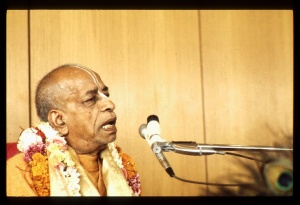CC Madhya 16.244 (1975): Difference between revisions
(Vanibot #0027: CCMirror - Mirror CC's 1996 edition to form a basis for 1975) |
(Vanibot #0020: VersionCompareLinker - added a link to the Version Compare feature) |
||
| Line 2: | Line 2: | ||
<div style="float:left">'''[[Sri Caitanya-caritamrta (1975)|Śrī Caitanya-caritāmṛta (1975)]] - [[CC Madhya (1975)|Madhya-līlā]] - [[CC Madhya 16 (1975)|Chapter 16: The Lord's Attempt to Go to Vṛndāvana]]'''</div> | <div style="float:left">'''[[Sri Caitanya-caritamrta (1975)|Śrī Caitanya-caritāmṛta (1975)]] - [[CC Madhya (1975)|Madhya-līlā]] - [[CC Madhya 16 (1975)|Chapter 16: The Lord's Attempt to Go to Vṛndāvana]]'''</div> | ||
<div style="float:right">[[File:Go-previous.png|link=CC Madhya 16.243 (1975)|Madhya-līlā 16.243]] '''[[CC Madhya 16.243 (1975)|Madhya-līlā 16.243]] - [[CC Madhya 16.245-246 (1975)|Madhya-līlā 16.245-246]]''' [[File:Go-next.png|link=CC Madhya 16.245-246 (1975)|Madhya-līlā 16.245-246]]</div> | <div style="float:right">[[File:Go-previous.png|link=CC Madhya 16.243 (1975)|Madhya-līlā 16.243]] '''[[CC Madhya 16.243 (1975)|Madhya-līlā 16.243]] - [[CC Madhya 16.245-246 (1975)|Madhya-līlā 16.245-246]]''' [[File:Go-next.png|link=CC Madhya 16.245-246 (1975)|Madhya-līlā 16.245-246]]</div> | ||
{{CompareVersions|CC|Madhya 16.244|CC 1975|CC 1996}} | |||
{{RandomImage}} | {{RandomImage}} | ||
==== TEXT 244 ==== | ==== TEXT 244 ==== | ||
<div class="verse"> | <div class="verse"> | ||
: | :dekhi' tāṅra pitā-mātā baḍa sukha pāila | ||
:tāṅhāra āvaraṇa kichu śithila ha-ila | :tāṅhāra āvaraṇa kichu śithila ha-ila | ||
</div> | </div> | ||
| Line 18: | Line 17: | ||
<div class="synonyms"> | <div class="synonyms"> | ||
dekhi'-seeing; tāṅra—his; pitā-mātā—father and mother; baḍa—very much; sukha—happiness; pāila—got; tāṅhāra āvaraṇa—strong vigilance upon him; kichu—something; śithila ha-ila—became slackened. | |||
</div> | </div> | ||
| Line 25: | Line 24: | ||
<div class="translation"> | <div class="translation"> | ||
When Raghunātha | When Raghunātha dāsa's father and mother saw that their son was acting like a householder, they became very happy. Because of this, they slackened their guard. | ||
</div> | </div> | ||
| Line 32: | Line 31: | ||
<div class="purport"> | <div class="purport"> | ||
When Raghunātha | When Raghunātha dāsa's father and mother saw that their son was no longer acting like a crazy fellow and was responsibly attending to his duties, they became very happy. The eleven people-five watchmen, four personal servants and two brāhmaṇas-who were guarding him became less strict in their vigilance. When Raghunātha dāsa actually took up his household affairs, his parents reduced the number of guards. | ||
</div> | </div> | ||
Latest revision as of 09:59, 27 January 2020

A.C. Bhaktivedanta Swami Prabhupada
TEXT 244
- dekhi' tāṅra pitā-mātā baḍa sukha pāila
- tāṅhāra āvaraṇa kichu śithila ha-ila
SYNONYMS
dekhi'-seeing; tāṅra—his; pitā-mātā—father and mother; baḍa—very much; sukha—happiness; pāila—got; tāṅhāra āvaraṇa—strong vigilance upon him; kichu—something; śithila ha-ila—became slackened.
TRANSLATION
When Raghunātha dāsa's father and mother saw that their son was acting like a householder, they became very happy. Because of this, they slackened their guard.
PURPORT
When Raghunātha dāsa's father and mother saw that their son was no longer acting like a crazy fellow and was responsibly attending to his duties, they became very happy. The eleven people-five watchmen, four personal servants and two brāhmaṇas-who were guarding him became less strict in their vigilance. When Raghunātha dāsa actually took up his household affairs, his parents reduced the number of guards.